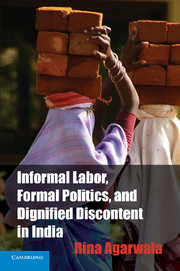Book contents
- Frontmatter
- Contents
- List of Tables
- List of Figures
- Acknowledgments
- Abbreviations
- 1 Introduction
- 2 Struggling with Informality
- 3 The Success of Competitive Populism
- 4 Communism's Resistance to Change
- 5 The Minimal Gains of Accommodation
- 6 Conclusion
- Appendix I Photos of Informal Workers in Construction and Bidi
- Appendix II The Evolution of the Count of Informal Workers
- Appendix III Interview Methodology
- References
- Index
5 - The Minimal Gains of Accommodation
Published online by Cambridge University Press: 05 March 2013
- Frontmatter
- Contents
- List of Tables
- List of Figures
- Acknowledgments
- Abbreviations
- 1 Introduction
- 2 Struggling with Informality
- 3 The Success of Competitive Populism
- 4 Communism's Resistance to Change
- 5 The Minimal Gains of Accommodation
- 6 Conclusion
- Appendix I Photos of Informal Workers in Construction and Bidi
- Appendix II The Evolution of the Count of Informal Workers
- Appendix III Interview Methodology
- References
- Index
Summary
The state of Maharashtra provides our final case of how state factors affect the amount and type of benefits that informal workers attain. In this study, Maharashtra exemplifies a “middle success” case for the new informal workers’ movement outlined in Chapter 2. Like in West Bengal (examined in Chapter 4), informal workers in Maharashtra have had limited success in eliciting benefits from the state. The state's informal workers are forced the Maharashtrian government to show some interest in providing minimal levels of welfare. Twenty-three of the forty informal workers interviewed for this study received a material benefit in Maharashtra (as opposed to thirty of the forty in Tamil Nadu and only twenty-one of the sixty in West Bengal). In contrast to West Bengal, of the benefits informal workers attained in Maharashtra, nearly all were welfare benefits and relatively few were work-based benefits, indicating a greater focus on the new informal workers’ movement. Unlike Tamil Nadu (examined in Chapter 3), however, most of the welfare benefits were provided by the unions, rather than the state, indicating less success in institutionalizing the new movement into the state's political agenda.
Drawing from the state framework outlined in the Introduction, I argue in this chapter that informal workers’ limited success in attaining state-provided welfare benefits in Maharashtra can be attributed to the state's commitment to liberalization and its electoral context, which has been largely uncompetitive and never pro-poor. Maharashtra's political leadership encountered some competition in the 1990s, but all the competing parties have appealed to intermediate and elite caste members and been impervious to mass demands for social justice and equity. Informal workers, therefore, have not had ample opportunities to use their mass, plebian, or “poor” vote bank to attract politicians. Maharashtra's economic policies, however, have provided informal workers with a small window of political opportunity to attain welfare benefits. Since the early 1990s, Maharashtra's government has pursued liberalization policies (including deregulation and privatization) alongside an active, pro-business industrial policy that includes building export-promotion zones and reforming labor laws. These policies have undermined workers’ ability to pressure employers and have stifled some of the strongest workers’ struggles in India. At the same time, they have enabled the state's informal workers to attain some welfare benefits for their members by claiming to be a partner in the state's economic agenda.
- Type
- Chapter
- Information
- Publisher: Cambridge University PressPrint publication year: 2013



